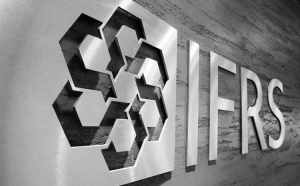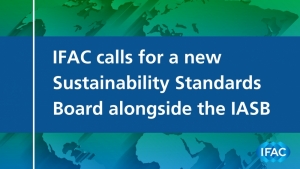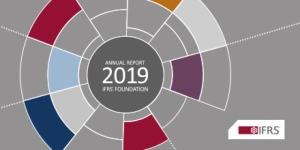عرض العناصر حسب علامة : IFRS Foundation
تعرف على رئيس مجلس معايير المحاسبة الدولي الجديد -أندرياس باركو
أندرياس باركو ليس غريباً على مؤسسة المعايير الدولية لإعداد التقارير المالية -فقد عمل في العديد من الهيئات الاستشارية للمؤسسة. في 1 يوليو 2021، بدأ ولايته الأولى كرئيس لمجلس معايير المحاسبة الدولية، خلفًا لهانس هوغرفورست الذي أنهى ولايته الثانية في 30 يونيو.
معلومات إضافية
-
المحتوى بالإنجليزية
Andreas Barckow is no stranger to the IFRS Foundation—he has served on several Foundation advisory bodies. On 1 July 2021, he begins his first term as Chair of the International Accounting Standards Board (Board), taking over from Hans Hoogervorst who finished his second term on 30 June.
Andreas joined the Foundation in April 2021 to ensure a smooth transition period, spending the past few weeks getting to know the organisation and its people. Due to covid-19 travel restrictions, his orientation has so far been purely virtual, so he is looking forward to moving from Bad Homburg, near Frankfurt, to London, where the Foundation is headquartered.
Here, he talks about his career, his experience at the Foundation so far and his priorities for the next few years.
You have spent the past few months working with Hans and the other Board members to prepare to take over. What have you learned that you didn’t necessarily expect to find out?
Actually, the number of surprises has been very limited, which may be due to the fact that I have been following the IASB for more than 15 years and have been active in its work over the past six years in one capacity or another. I am looking very much forward to working with our talented and highly motivated people.
Thinking back over your years in accounting standard-setting, is there one moment that stands out?
I don’t think I can offer a single one-off highlight. There have been many—the legendary jokes of Sir David Tweedie (IASB Chair 2001 to 2011) to ice-break a fierce discussion at the board table, the SEC accepting IFRS accounts of foreign filers with no reconciliation, or, more recently, the rising interest in sustainability have all left their mark. In an active role, working together with other standard-setters in international forums—such as the Accounting Standards Advisory Forum, International Forum of Accounting Standard Setters, World Standard-setters and the European Financial Reporting Advisory Group—has clearly been a highlight of my standard-setting work.
What do you see as the biggest challenges and opportunities facing the IASB in terms of financial reporting?
The biggest challenge I see is to remain relevant in an ever-changing environment. While I think that our literature has generally stood the test of time, there have been changes in the environment that clearly could not have been anticipated when the Standards were developed. I am thinking of economies becoming more service than manufacturing oriented. I am thinking of low and negative interest rates and their impact on discounting future cash flows. I am thinking of mega trends such as sustainability, and climate change in particular, as well as the rise of self-generated intellectual property and its non-addressal in the accounts, to name but a few. These and further issues are challenges to our work, but they are at the same time opportunities if we are willing to address them with our eyes wide open. And I have no doubt that we do have the necessary expertise to address them successfully and in a meaningful way.
What are your views on accounting going digital? What would most help the accounting industry to be more aligned with other industries in the 21st century?
Accounting is lagging other domains in digitisation. The way we address presentation and disclosure issues in standard-setting still seems be largely guided (and limited) by thinking about a printed page rather than about a screen. I find it curious that every transaction and event we record is originally processed in digital format. However, when it comes to preparing accounts, we aggregate everything to the highest degree possible and make it available in printed format—only to then see people arguing that more disaggregation and availability in digital format would be preferable. Something does not seem right here. The way accounting information is being used changes rapidly, and technology that was appropriate five to 10 years ago may no longer be considered best in class today or tomorrow. So, one to watch and to address.
What are your priorities for your first year as Chair of the IASB?
I want to continue the successful work of my predecessors in building trust globally in IFRS Standards and fostering their consistent application. At the same time, I’d like to help our organisation to become more agile. I realise that this may be easier said than done, as much of the IASB’s work is determined by our current agenda and the due process we follow. The IASB has moved quickly to respond to stakeholder requests, yet its responses have been predominantly reactive rather than proactive. It is to the latter end that I wish to see myself having an impact.
The other area I would like to review is whether we can become more effective in how we communicate with and explain the Board’s decisions to our various stakeholders. Having been at the receiving side of communications, I am aware of perception issues that have arisen, so I would like to work with our organisation to address these.
Your term has just started, but what are you most looking forward to?
Seeing my colleagues in person rather than talking to my computer screen all day! I cannot wait to go back to physical meetings. Virtual does have its advantages, no doubt. But it comes with several challenges, too, and I think there is nothing better than a person-to-person conversation in a room.
How did you end up following a career in accounting?
After school I did a traineeship at a bank, and this paved the way for my interest in economics and business administration more broadly. I always had an interest in international economics, international management, finance, and accounting, so choosing something along those lines seemed logical. And when I was offered a position to do a doctorate in accounting, this got me on track entirely.
Besides accounting, what are your other passions?
Classical music and travelling. My wife and I are regular concert-goers, and we both sing in a chamber choir at our church, with a concert every six to eight weeks in non-covid times. Whether this will remain possible with my new role and commitments, I will have to figure out. My other big interest is travelling the world, and I have been blessed with jobs that have allowed me to visit many places around the globe.
Finally, what is your favourite IFRS Standard and why?
Having done my PhD on the accounting for derivatives and hedging activities, it will probably not come as a surprise to anyone if I said ‘everything that is related to financial instruments’!
ملخص الاجتماعات من مجموعة عمل الاستعداد الفني، والتي تم إنشاؤها من قبل أمناء مؤسسة IFRS
اقرأ ملخصات الاجتماعات من مجموعة عمل الاستعداد الفني، والتي تم إنشاؤها من قبل أمناء مؤسسة IFRS لدعم عملهم على الإنشاء المحتمل لمجلس جديد لوضع المعايير.
معلومات إضافية
-
المحتوى بالإنجليزية
Technical Readiness Working Group
In answer to the growing and urgent demand to improve the global consistency and comparability of companies’ sustainability disclosures to meet the needs of investors and other capital market participants, the Trustees of the IFRS Foundation are working toward the creation an international sustainability standards board. The Trustees are assessing whether they can achieve their criteria for creating such a board and intend to make a final determination by COP26 in Glasgow.
To enable the potential new board to build on the well-established work of long-standing international initiatives focused on enterprise value, the Trustees have created the Technical Readiness Working Group (TRWG) of leading organisations with expertise in sustainability and integrated reporting standard-setting focused on meeting investors’ needs.
The TRWG aims to provide a running start for the potential new board, as described in the Trustees’ 8 March 2021 statement. The TRWG also responds to the International Organization of Securities Commissions' (IOSCO) 24 February 2021 call for the coordination of work to drive international consistency of companies’ sustainability-related disclosures that focus on enterprise value creation.
The TRWG’s role is to provide technical observations and proposals for consideration by the potential new board, as well as to formulate joint strategic recommendations regarding the potential transfer of content, technical expertise and resources to the board.
Participants of the TRWG will meet regularly at three types of meetings:
1) Strategic meetings
The TRWG conducts monthly and ad hoc strategic meetings, which are chaired by a member of the Foundation’s Trustees Steering Committee on Sustainability Reporting (Trustees Steering Committee). The Foundation and member organisations may also hold complementary bilateral discussions as needed to realise the overall plan. Meeting summaries are available from the meetings tab.
2) Operational and Technical meetings
Member organisation meet for fortnightly discussions, chaired by the Foundation’s Executive Director. The purpose of the operational and technical meetings is to:
prepare material to inform strategic discussions about the potential transfer of technical expertise and resources to the potential new board; and
oversee technical proposals from working-level meetings.
3) Working-level meetings
The TRWG conducts weekly working-level meetings attended by leading technical staff of member organisations and facilitated by a leading Foundation staff member. The working-level meetings conduct the detailed technical work required for the TRWG to fulfil its deliverables. - البلد الأردن
مؤسسة المعايير الدولية لإعداد التقارير المالية تمضي قدمًا في مجلس معايير الاستدامة الدولية
يعلن أمناء مؤسسة المعايير الدولية لإعداد التقارير المالية (IFRS) عن توجه استراتيجي وخطوات أخرى بناءً على التعليقات علي استشارة إعداد تقارير الاستدامة
معلومات إضافية
-
المحتوى بالإنجليزية
IFRS Foundation Trustees announce strategic direction and further steps based on feedback to sustainability reporting consultation
The Trustees of the IFRS Foundation met 2-4 March 2021 to continue their analysis and discussions of the feedback received to their Consultation Paper on Sustainability Reporting (2020 Consultation).
Feedback to the 2020 Consultation confirmed an urgent need for global sustainability reporting standards and support for the Foundation to play a role in their development. The Trustees are therefore continuing their work on the establishment of an international sustainability reporting standards board within the existing governance structure of the IFRS Foundation, as set out in the Trustees’ February announcement.
The Trustees welcomed the February 2021 public statement by the IOSCO Board, announcing IOSCO's intention to work with the IFRS Foundation in developing a plan to establish a new board for setting sustainability reporting standards that meet the needs of the capital markets. This will include consideration of future endorsement of the new board and its standards. The Trustees recognise the importance for the public interest of reporting standards that address enterprise value, which captures expected value creation for investors in the short, medium and long term and is interdependent with value creation for society and the environment.
Based on the feedback to the 2020 Consultation, and encouraged by the IOSCO Board statement, the Trustees have reached the following views about the strategic direction of a new board:
Investor focus for enterprise value: the new board would focus on information that is material to the decisions of investors, lenders and other creditors.
Sustainability scope, prioritising climate: due to the urgent need for better information about climate-related matters, the new board would initially focus its efforts on climate-related reporting, while also working towards meeting the information needs of investors on other ESG (environmental, social and governance) matters.
Build on existing frameworks: the new board would build upon the well-established work of the Financial Stability Board’s Task Force on Climate related Financial Disclosures (TCFD), as well as work by the alliance of leading standard-setters in sustainability reporting focused on enterprise value. The Trustees will consider the prototype proposed by the alliance for an approach to climate-related disclosures as a potential basis for the new board to develop climate-related reporting standards. To prepare for this work, the IFRS Foundation will initiate a process of structured engagement with the relevant organisations.
Building blocks approach: by working with standard-setters from key jurisdictions, standards issued by the new board would provide a globally consistent and comparable sustainability reporting baseline, while also providing flexibility for coordination on reporting requirements that capture wider sustainability impacts.
The Trustees intend to publish a feedback statement that summarises the responses received to their 2020 Consultation, and how that feedback informed the above decisions. Together with the feedback statement, the Trustees will publish for public comment the proposed changes to the Foundation’s Constitution necessary to formalise establishment of a new board, including its composition. The Trustees will continue to engage with the IFRS Foundation Monitoring Board and be informed of their views to proposed changes. Any changes to the Constitution are subject to a public consultation with a 90-day comment period.
The Trustees remain on track to make a final determination about a new board in advance of the November 2021 United Nations COP26 conference, including the detailed analysis of feedback on the requirements for success outlined in the 2020 Consultation and other conditions to be satisfied prior to that consideration. - البلد الأردن





